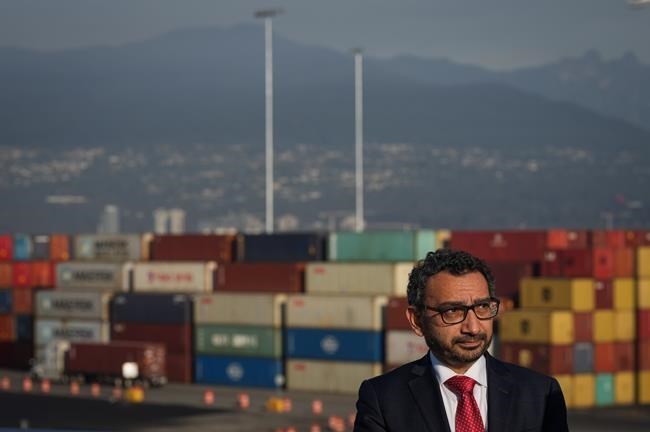OTTAWA — The Vancouver Fraser Port Authority is suspending a controversial program to replace older trucks servicing the port for at least another nine months while it reassesses its plans.
It is the third time the port is postponing the Rolling Truck Program, which was supposed to begin April 3 to phase out trucks more than 12 years old to improve air quality and community health.
Truckers who use the port say the onus is on owners and operators to replace the older vehicles at a steep cost, even though many of them already meet emissions standards.
The port authority says the decision comes because of the state of the economy and ongoing issues related to the pandemic but it plans to explore new technologies and will reassess its emissions-reduction strategy.
The latest delay comes after four Liberal MPs wrote letters to Transport Minister Omar Alghabra expressing their frustration over the program and asking him to intervene.
In a statement on Twitter, Alghabra said the Liberal government is committed to working with both the port authority and truck drivers to find a common path forward.
A letter from Surrey, –°¿∂ ”∆µ, MP Randeep Sarai earlier this week said he has met with truckers who have complied with the new measures but still find it unreasonable and worry about the requirement to replace more vehicles from their fleets down the road.
Other Liberal MPs from the area, including Sukh Dhaliwal, Parm Bains and John Aldag, sent similar letters.
Conservative Leader Pierre Poilievre called on Prime Minister Justin Trudeau to direct Alghabra to "immediately cancel" the program in a statement on Thursday.
"Justin Trudeau’s out-of-touch government is supporting another back-breaking policy at the Port of Vancouver that will further drive up the cost of goods," Poilievre said.
Gagan Singh, a spokesperson for the United Truckers Association, said he wants the program scrapped entirely, and called on the federal government to facilitate talks with the port.
For others, news of the delay is "unfortunate." Dave Earle, president and CEO of the British Columbia Trucking Association, said people knew the change was coming.
"The vast majority of operators have already chosen to make the investment necessary to reduce their (greenhouse gas) profile," said Earle. "While the transition is difficult to do, certainly, it's been in the works for a long time."
Earle said newer vehicles are more fuel efficient and have lower greenhouse gas emissions.
"We've talked with every level of government about supporting the industry and accelerating fleet turnover — that is one of the best things we can do," said Earle.
He remains "deeply hopeful" that the program will eventually happen.
Although the legislation was introduced under Stephen Harper's former Conservative government, implementation of the program happened under the current government.
In a press release, the Port of Vancouver said it will consider new technologies and federal and provincial "fleet greening programs." It also intends to reassess its emissions-reduction strategy.
The port said 85 per cent of truck operators are compliant with requirements of the program, which it estimates has led to a 79 per cent reduction in diesel particulate matter.
The port has also said in a previous press release that once trucks built before 2009 have been removed, it expects to see a reduction of about 15,000 tonnes of greenhouse gases being released each year, including 575 tonnes of smog-forming nitrogen oxide and 37 tonnes of carcinogenic particulate matter.
This report by The Canadian Press was first published Feb. 24, 2023.
Maya Riachi, The Canadian Press




